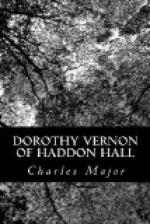“You did not know my voice,” said John, “nor did you penetrate my disguise. You once said that you would recognize me though I wore all the petticoats in Derbyshire.”
“Please don’t jest with me now,” pleaded Dorothy. “I cannot bear it. Great joy is harder to endure than great grief. Why did you not reveal yourself to me at the Hall?” she asked plaintively.
“I found no opportunity,” returned John, “others were always present.”
I shall tell you nothing that followed. It is no affair of yours nor of mine.
They were overjoyed in being together once more. Neither of them seemed to realize that John, while living under Sir George’s roof, was facing death every moment. To Dorothy, the fact that John, who was heir to one of England’s noblest houses, was willing for her sake to become a servant, to do a servant’s work, and to receive the indignities constantly put upon a servant, appealed most powerfully. It added to her feeling for him a tenderness which is not necessarily a part of passionate love.
It is needless for me to tell you that while John performed faithfully the duty of keeping bright the fires in Haddon Hall, he did not neglect the other flame—the one in Dorothy’s heart—for the sake of whose warmth he had assumed the leathern garb of servitude and had placed his head in the lion’s mouth.
At first he and Dorothy used great caution in exchanging words and glances, but familiarity with danger breeds contempt for it. So they utilized every opportunity that niggard chance offered, and blinded by their great longing soon began to make opportunities for speech with each other, thereby bringing trouble to Dorothy and deadly peril to John. Of that I shall soon tell you.
During the period of John’s service in Haddon Hall negotiations for Dorothy’s marriage with Lord Stanley were progressing slowly but surely. Arrangements for the marriage settlement by the Stanleys, and for Dorothy’s dower to be given by Sir George, were matters that the King of the Peak approached boldly as he would have met any other affair of business. But the Earl of Derby, whose mind moved slowly, desiring that a generous portion of the Vernon wealth should be transferred with Dorothy to the Stanley holdings without the delay incident to Sir George’s death, put off signing the articles of marriage in his effort to augment the cash payment. In truth, the great wealth which Dorothy would bring to the house of Stanley was the earl’s real reason for desiring her marriage with his son. The earl was heavily in debt, and his estate stood in dire need of help.




